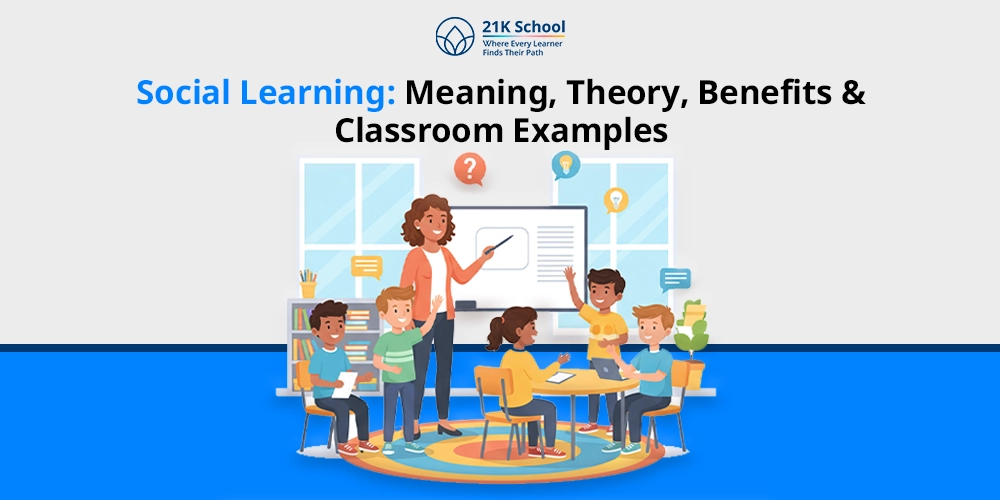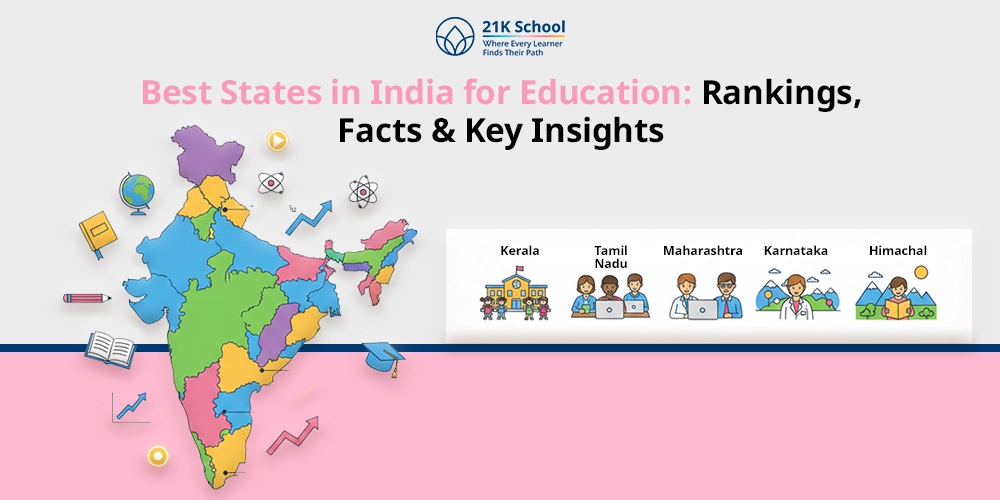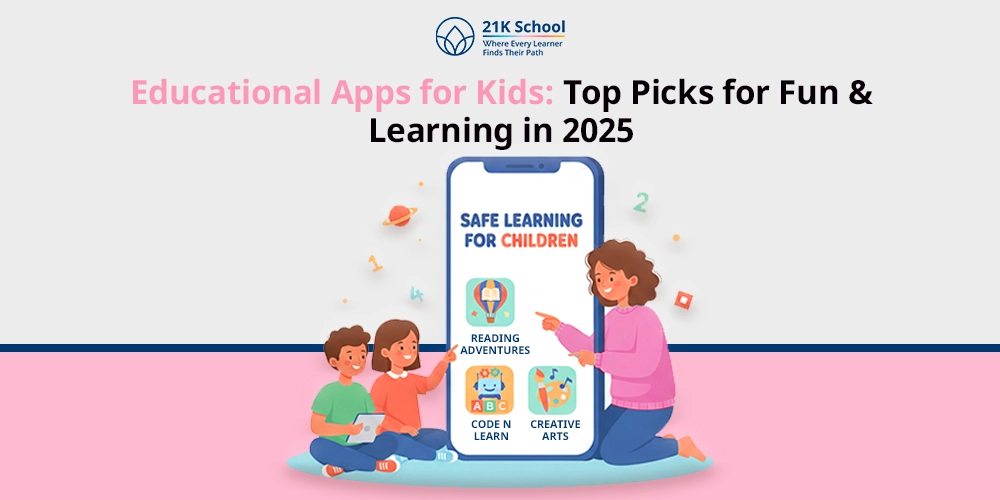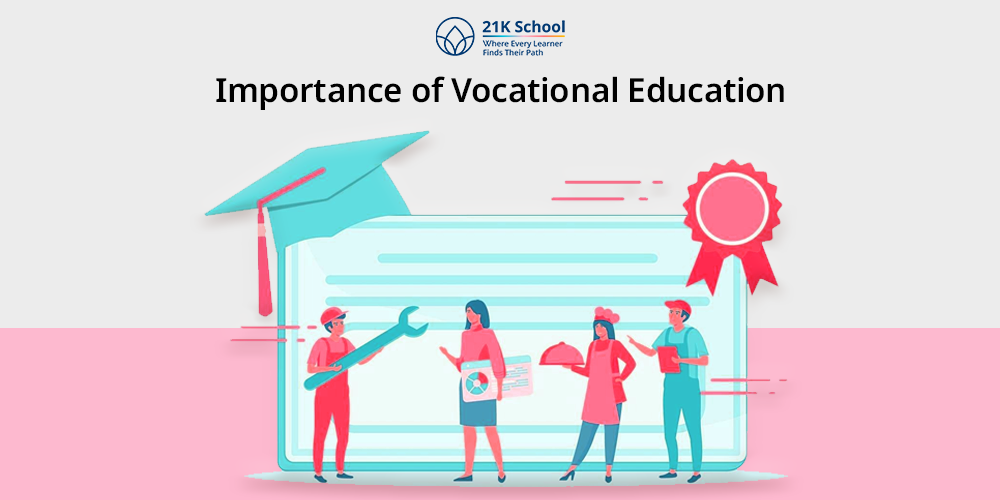
Have you ever wondered why vocational education has become a necessity in education?
Vocational education has become essential in today’s modern world to acquire practical skills. Vocational education provides students with practical skills and enables students to acquire a deeper understanding.
Vocational education helps students to become employable and makes them financially capable. Earlier, vocational education was meant for artisans, craftsmen, mechanics, technicians, etc., but now it has gained a wide demand in every field.
Vocational education prepares students with the necessary skill sets and allows them to develop an entrepreneurial mindset as well as build skills.
According to the National Education Policy (NEP) 2020, vocational education must be implemented in every school as a part of vocational studies.
Many online schools, such as 21K School also provide vocational training through experiential learning. Vocational education offers various career opportunities and provides them proper career guidance.
Contents
- What is Vocational Education?
- Top 10 Importance of Vocational Education
- 1. Provides Practical Skills
- 2. Prepare for Career Opportunities
- 3. Develop Entrepreneurial Skills
- 4. Promotes Teacher-Student Relationship
- 5. Boost Confidence
- 6. Enhance Problem-Solving Skills
- 7. Networking Opportunities
- 8. Economic Advantage
- 9. Addressing Diverse Learning Needs
- 10. Lifelong Learning and Adaptability
- Ending Note
What is Vocational Education?
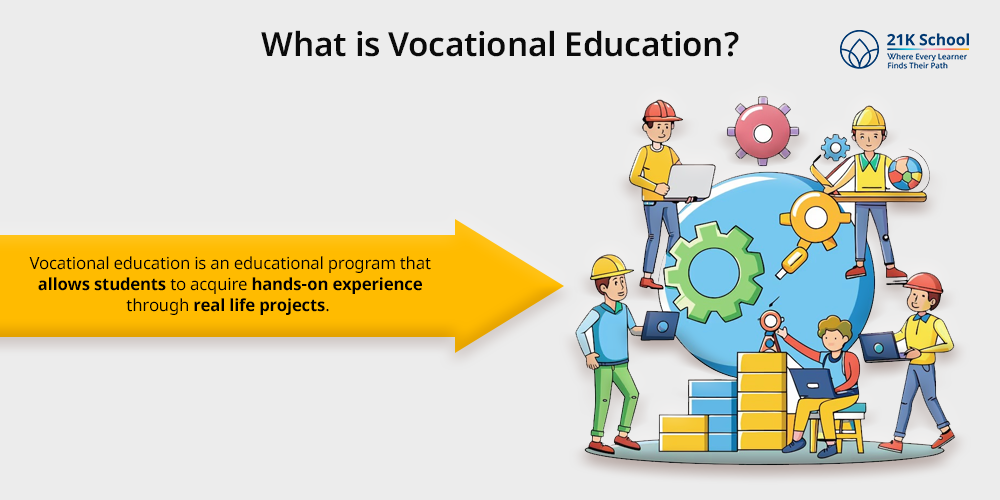
Vocational education is an educational program that allows students to acquire hands-on experience through real life projects. Vocational education also denotes the Career and Technical Education (CTE) or Technical Vocational Education and Training (TVET).
The Ministry of Skill Development and Entrepreneurship (MSDE) is the nodal ministry in India for the development and administration of programs pertaining to vocational education and skill development.
Vocational education is intended to help students develop the competencies of knowledge and abilities related to work or any profession. Vocational education provides practical skills and expertise in a specific field chosen by the student.
Vocational education offers a more practical and skill-based education as compared to traditional academic education. Vocational education helps in generating a productive workforce through skill-based programs, which enhance employability and prepare students for the workforce.
Top 10 Importance of Vocational Education
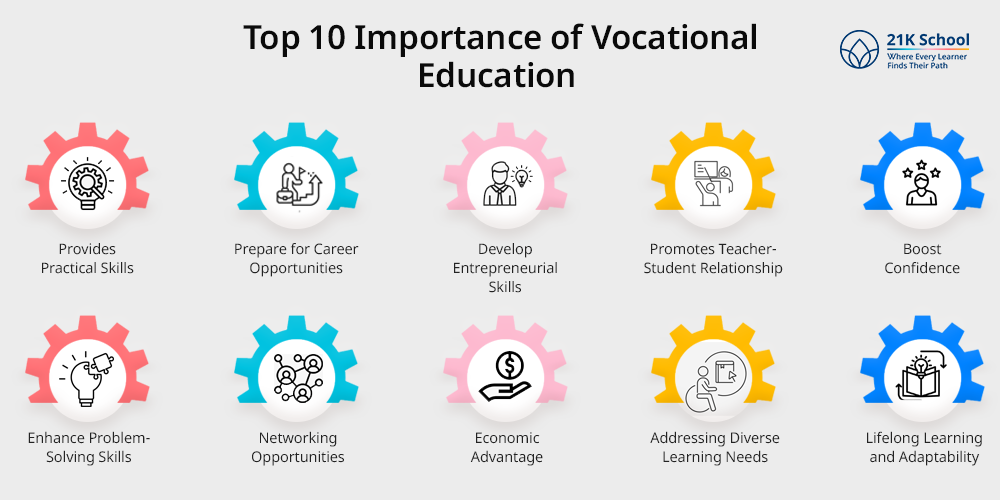
Vocational education plays an essential role in developing students’ practical skills. Vocational education allows students to prepare for the competitive job market and provides them with necessary skills.
Vocational education helps in eliminating unemployment by offering self-employment opportunities to students. Vocational education also prepares students for entrepreneurship and enables them to develop entrepreneurial skills. The following are the importance of vocational education.
1. Provides Practical Skills
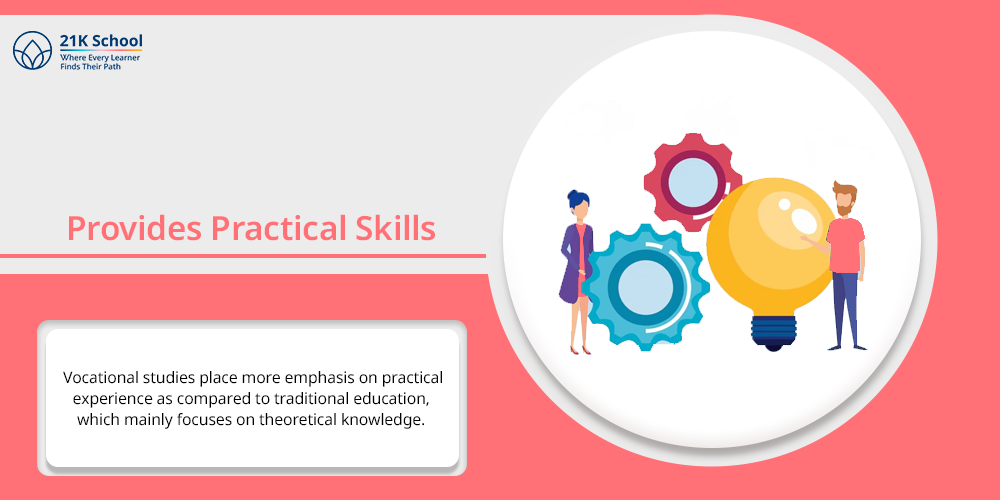
Vocational education is known for providing practical skills to students. Vocational studies place more emphasis on practical experience as compared to traditional education , which mainly focuses on theoretical knowledge .
In order to prepare students for their future careers, it provides workshops, simulations and real-world projects.
This hands-on approach enhances students’ skills and makes sure that students are conversant with the instruments, procedures and technologies utilized in their chosen fields. The practical learning creates a workforce and enhances employability in the private and government sectors.
2. Prepare for Career Opportunities

Vocational education prepares students for career opportunities by providing them with hands-on experience. In order to prepare students for specific career pathways, vocational studies modifies the curricula to meet the demands of today’s labour market.
In order to ensure that the skills and knowledge taught are up to date and in demand, programs are usually developed in collaboration with industry experts and working professionals.
Along with that, practical skills also prepare students for the workforce immediately after graduation.
3. Develop Entrepreneurial Skills
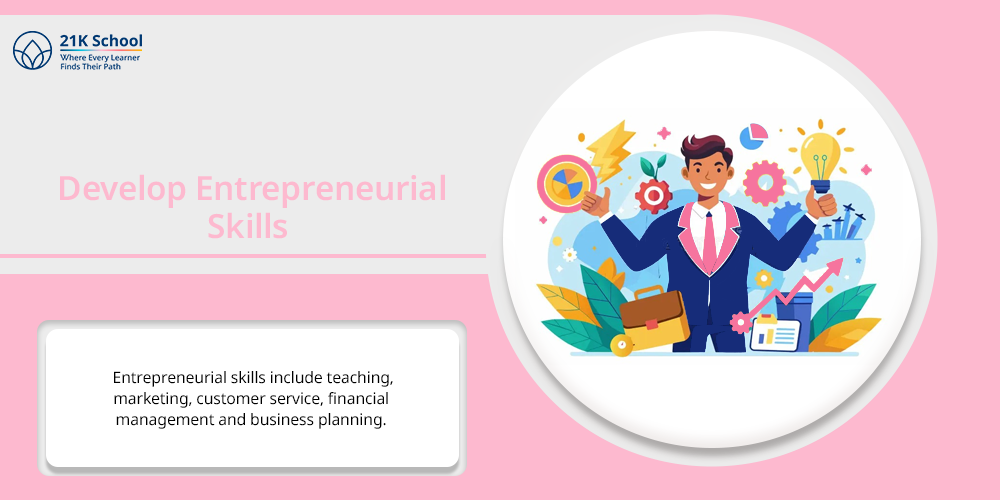
Another major element of vocational education is that it develops an entrepreneurial mindset among students. Entrepreneurial skills include teaching, marketing, customer service, financial management and business planning.
Vocational education teaches all the elements of entrepreneurship. Vocational studies foster creative thinking skills and create an entrepreneurial mindset .
This equips students with the skills necessary to launch their own businesses or support the local entrepreneurial community.
4. Promotes Teacher-Student Relationship
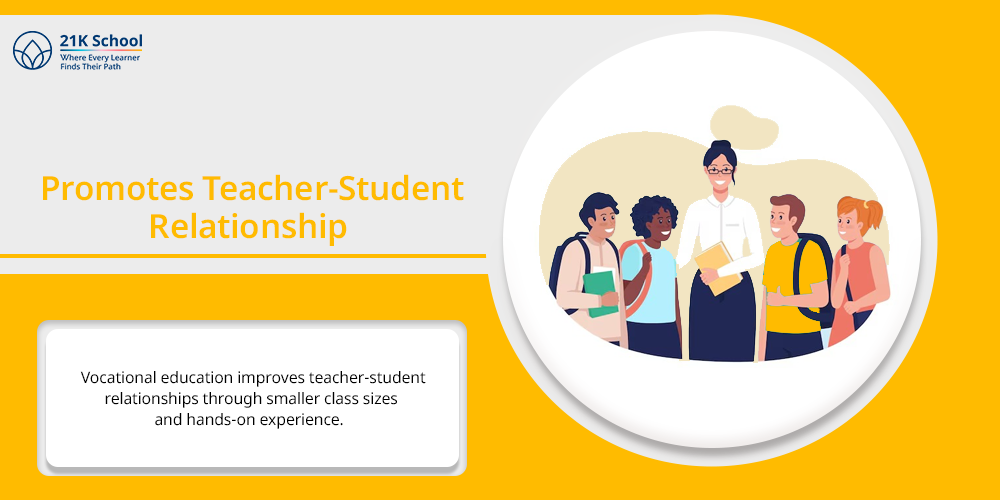
Vocational education improves teacher-student relationships through smaller class sizes and hands-on experience. In vocational programs teachers or industry experts can offer direction and practical knowledge to students through their own experiences.
This individualized attention makes students feel more supported in their learning process, which encourages them to ask questions, seek advice and enhance their engagement.
Positive teacher-student relationships are essential for stronger motivation, better memory retention, and fulfilling educational experiences.
5. Boost Confidence
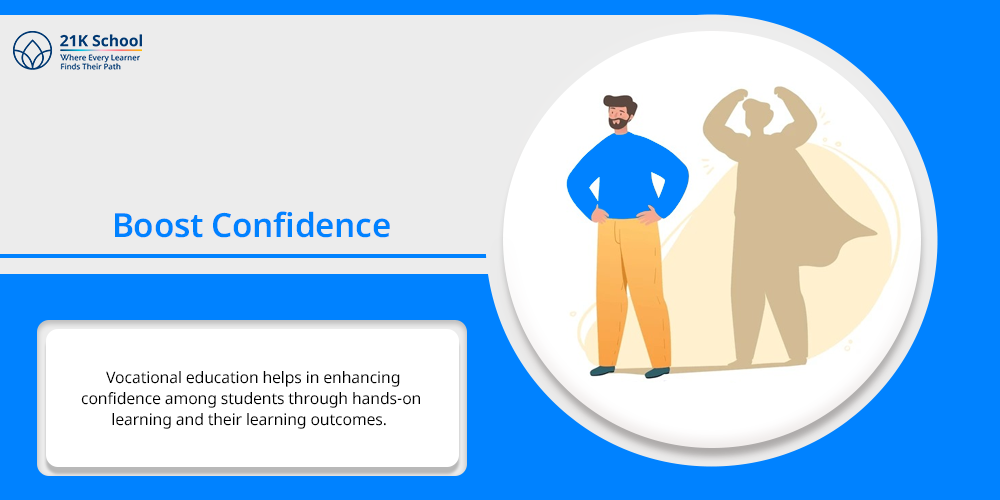
Vocational education helps in enhancing confidence among students through hands-on learning and their learning outcomes. Completing projects successfully and developing practical skills promote self-efficacy and a sense of accomplishment among childrens.
This confidence allows them to develop social skills and enhance their capabilities. Students who are confident in their abilities are more likely to take on challenges and grasp opportunities for their career growth.
6. Enhance Problem-Solving Skills
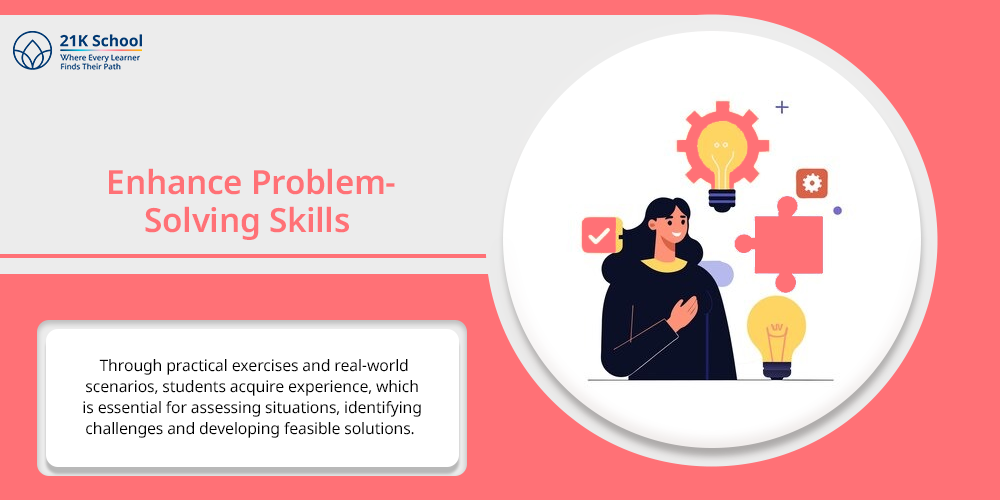
Vocational education enhances problem-solving skills through hands-on experience. Through practical exercises and real-world scenarios, students acquire experience, which is essential for assessing situations, identifying challenges and developing feasible solutions.
This experiential learning method helps students to think fast and adapt to changing circumstances better preparing them for the dynamic nature of the workforce.
Problem-solving skills are highly valued in today’s workforce as this enables them to adapt quickly as per the job requirements.
7. Networking Opportunities

Vocational education helps in developing networking opportunities through partnerships with local businesses and industries providing students with access to advantageous networks.
Through industry events, internships, apprenticeships, and other related tasks help students to connect with working professionals, learn from them and build relationships that may lead to job offers or mentorship.
Proper networking is a key element of career development and vocational education helps students develop a proper professional network that enhances their future employment.
8. Economic Advantage
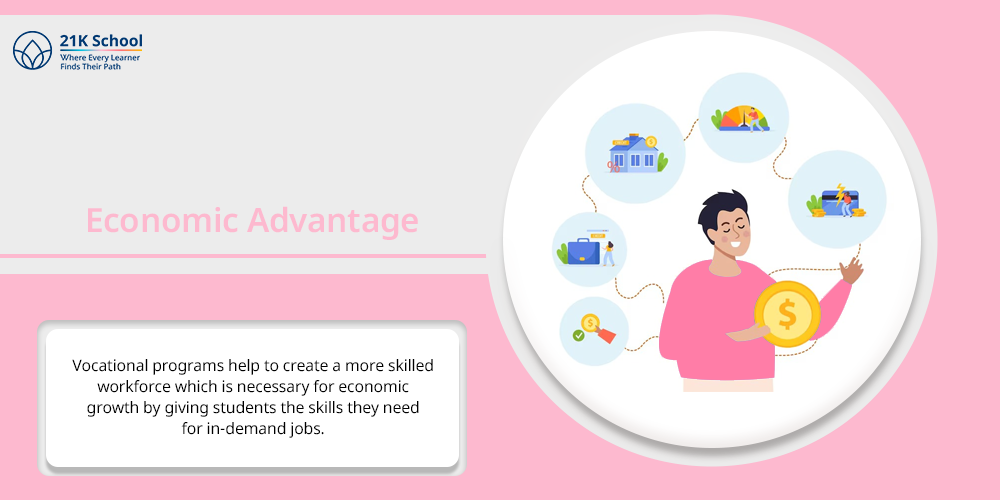
Vocational programs help to create a more skilled workforce which is necessary for economic growth by giving students the skills they need for in-demand jobs. Vocational education helps in enhancing the economy through developing more workforce.
Due to higher employment rate it emphasizes less dependency on social services and higher consumer spending.
Vocational education can also assist in filling skills shortages across a range of industries guaranteeing that companies have access to skilled laborers who can spur innovation and productivity.
9. Addressing Diverse Learning Needs
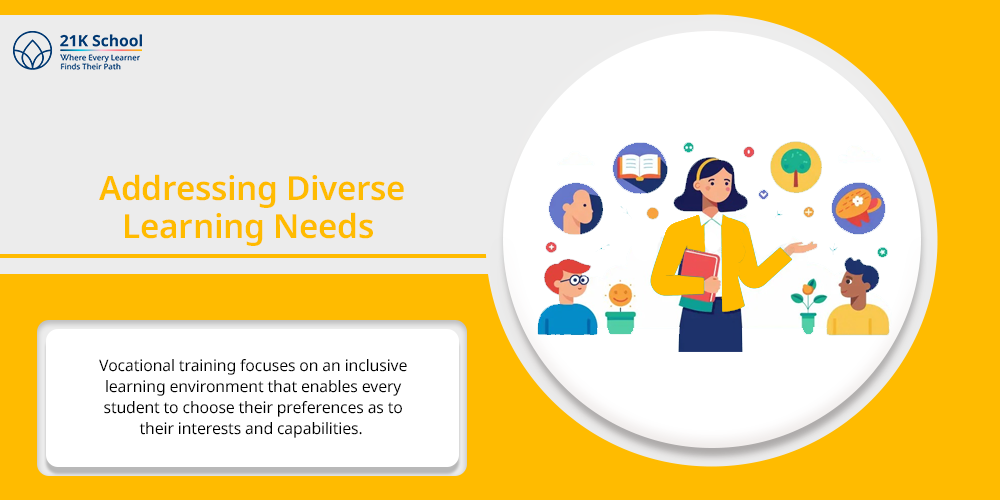
Vocational education addresses diverse learning needs, as it caters to a wide range of learning styles and preferences. Vocational training focuses on an inclusive learning environment that enables every student to choose their preferences as to their interests and capabilities.
It offers a practical hands-on approach that may be appealing to students who struggle to learn through traditional academic methods.
Vocational education provides a range of learning modalities such as visual auditory and kinesthetic learning opportunities ensuring that every student has the chance to succeed.
10. Lifelong Learning and Adaptability
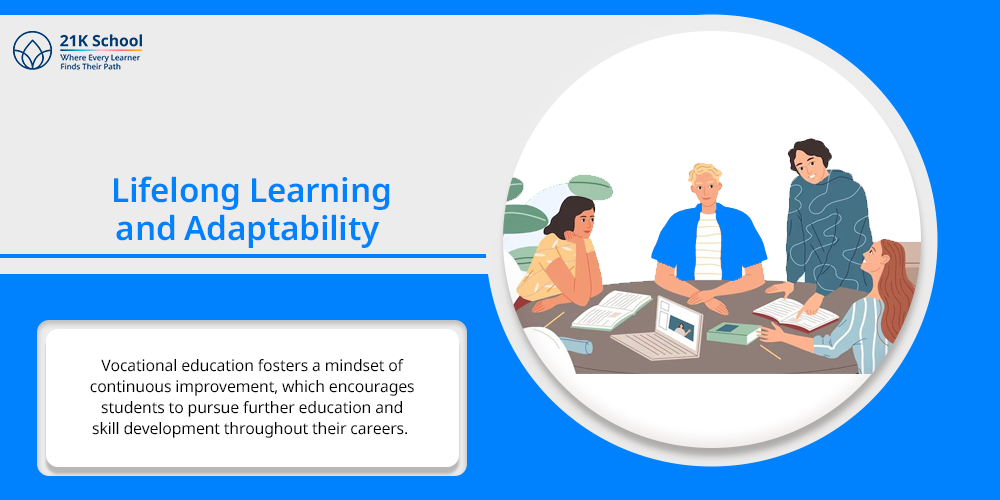
In a rapidly evolving job market, adaptability and lifelong learning are essential. Vocational education fosters a mindset of continuous improvement, which encourages students to pursue further education and skill development throughout their careers.
Many vocational programs emphasize the importance of staying up to date with industry trends and advancements preparing students to embrace change and seek out new learning opportunities.
This flexibility is essential for long-term professional success because it enables people to adapt to shifting market conditions, technological advancements and job demands.
Ending Note
Vocational education is a crucial component of today’s educational landscape because it equips students with the knowledge and real-world skills they need to thrive in the competitive job market.
Emphasising experiential learning in vocational programs not only increases employability but also fosters entrepreneurial skills, boosts confidence and fortifies ties between educators and learners.
Additionally, vocational education prepares people to adapt to the ever-changing demands of the workforce by fostering lifelong learning and meeting a variety of learning needs.
As it helps create a skilled, adaptable and economically empowered society, vocational education is becoming more and more significant.

